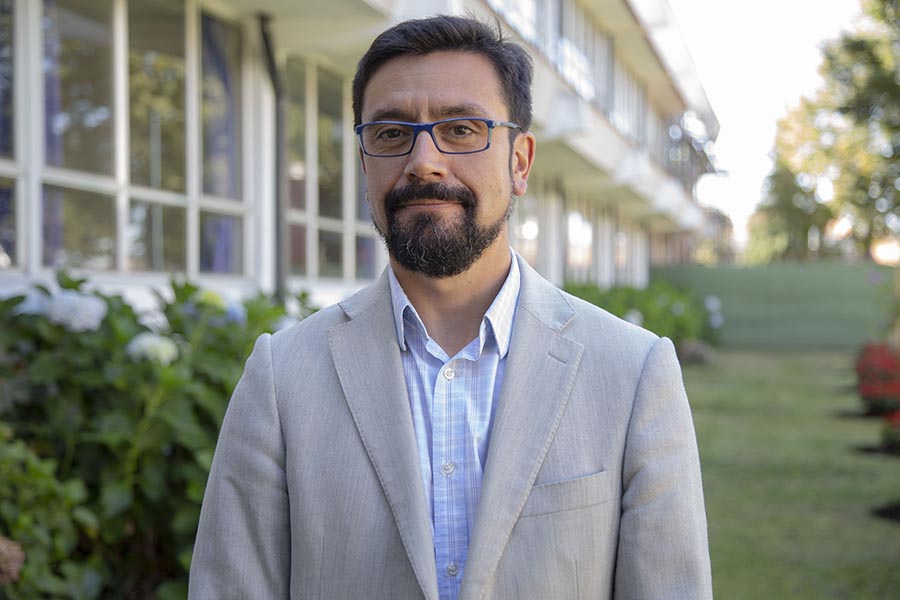|
Dr. Renato Hunter, the Vice-rector for Research and Graduate Studies of the UFRO visited five universities and technology parks in Israel, together with peers of six other Chilean universities. |
The technological ecosystems developed in Israel since its creation as a state in 1948 have turned this country into a great power in R&D&I. The state invests 4.5% of their GDP in research, the second highest amount worldwide. It also has 354 multinational companies, 23 business incubators, 106 accelerators and more than 250 Venture Capital funds, what turns the country into a leader in startups. With the aim of learning more about that, Dr. Renato Hunter, the Vice-rector for Research and Graduate Studies of the Universidad de La Frontera (UFRO), along with his peers from six other Chilean universities, went to Israel and made a tour, which included several technology parks, universities, institutes and research centers. The synergy between universities and businesses is one of the main strategies. It is a collaborative model that allows to strengthen the research focus regarding the fields of priority in the country. In this context, one of the establishments they visited was the Ben-Gurion University of the Negev in the south of Israel. Its particularity is its Advanced Technology Park that is managed by the university itself. “There is a building in that same park that was built by the university and three others built by multinational companies, which have set up their headquarters for development and research there. They are natural allies, there is an integration between university and company, they work together in a unified way,” Dr. Hunter explained. Another institution they visited was the Technion – Israel Institute of Technology, located in Haifa, in the north of Israel. There, they got to know a technology transfer model characterized by the strong focus on startup creation. The institute is less than 50 years old, has 13,500 thousand students, 60 innovation centers, 3 main research lines and an income of 289 million dollars only by licensing in one year. “They focus on encouraging the students to innovate since the beginning of their professional training. That means that, today, they already registered more than a thousand patents,” Dr. Hunter points out. The University of Haifa, which has a specific and autonomous unit for commercialization and licensing, where the process of intellectual protection and the negotiation to put the product on the market is done, was also on their schedule. “The researcher is not involved in the negotiation process,” the university authority explains. They also found a similar system at the Weizmann Institute of Science in Tel Aviv, whose technology transfer unit operates independently, with an annual budget of 400 million dollars (only for licensing). In Jerusalem, they visited the Hebrew University that already won 8 of the 12 Nobel Prizes the country has. One of the latest successful businesses created at this university is Mobileyes, a security device to prevent car accidents, developed by a professor of the university. “It is interesting how they concentrate on patenting, without focusing on the finished product, but on the different stages of invention, for example, they can enter the market with a formula of a drug, but not necessarily with the finished product,” Dr. Hunter explains. PRODUCTIVITY AND COOPERATION Israel has only nine universities. All of them are public. The state invests the necessary funds so the universities can operate, but the growth of them is financed through competitive projects associated with the priority lines and indicators of productivity. The Israel Research Agency has a group of researchers who visit the different universities and technology parks in order to identify common aspects of development, thus making thematic calls for the development of new technologies and projects. “They focus on specific fields, but above all, they establish a deep cooperative ecosystem. About 300 thousand people are working on knowledge and development. It is a small nucleus, where the main recipe is cooperation and the creation of networks. Besides, they have a culture of failure as a learning process, it is not stigmatized,” the vice-rector comments. After the trip and in order to continue learning about Israel’s R&D&I model, the participants of the Chilean universities are arranging the visit of an expert of the Hebrew University of Jerusalem in Chile, so he can share his experience in technology transfer with the Chilean universities.
Written by: Karimme Riadi
Vice-rectorate for Research and Graduate Affairs |





